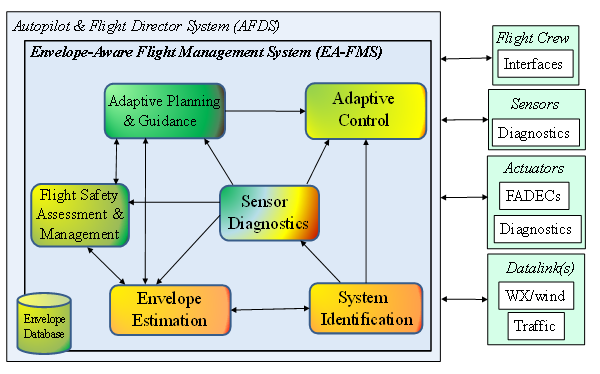Envelope Aware Flight Management System (EA-FMS) is a novel flight management system that supports Loss of Control (LOC) prediction, prevention, and recovery through an integrated suite of adaptive algorithms to augment conventional Autopilot and Flight Director Systems (AFDS). The EA-FMS consists of the following key modules
- Flight Safety Assessment and Management
- Envelope Estimation
- Adaptive Path Planning and Guidance
- System Identification
- Adaptive Control
Flight Safety Assessment and Management (FSAM)
FSAM is responsible for the real time assessment of LOC risk and activation of LOC warnings and resilient control overrides. Flight safety assessment begins by computing qualitative and quantitative metrics used to assess loss of control risk and recoverability using the conventional ADFS and EA-FMS adaptive system.
Envelope Estimation
Envelope estimation is responsible for computing and updating representations of safe and recoverable sets if the aircraft model parameters change online.
Adaptive Path Planning and Guidance
This module enables the adaptation of flight plans and guidance outputs to avoid or recover from LOC. In case of commercial transport, the mission is to safely fly from takeoff through landing, ideally at the destination airport. Adaptive planning/guidance algorithms execute only in cases of high LOC risk, so the primary goal for EA-FMS is to reduce LOC risk until conventional AFDS operations can resume or until an emergency landing has been planned and executed.
System Identification
System identification can assess variations in the aircraft dynamics due to gradual changes (e.g., icing) or sudden changes (e.g., control surface failure). In effect, system identification provides model updates as the dynamics of the aircraft change. These updates may be based on parameter estimates, such as stability derivatives. The updated model can then be used for envelope estimation, adaptive control, and guidance.
Adaptive Control
Unlike fixed-gain control methods, such as classical, optimal, and robust control, adaptive control is self tuning in response to the properties of the actual aircraft. This aircraft is crucial to LOC prevention/recovery, where the crew and autopilot may not be able to recover control in the presence of unforeseen anomalies.

